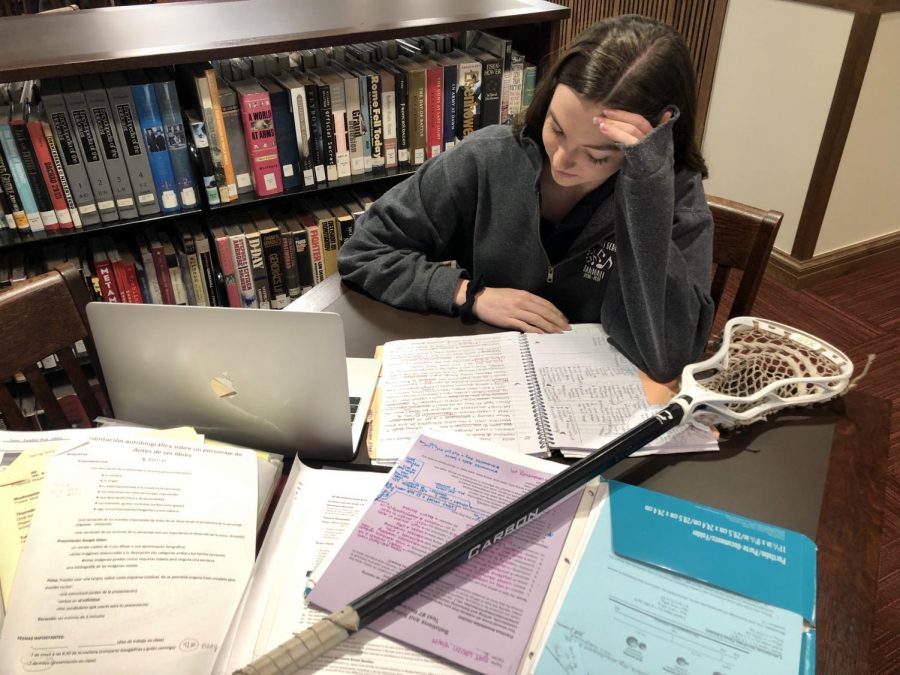How extracurricular activities stress academic performance
Sophomore Max Beard shares his thoughts about the effects of extracurricular activities on the academic life of SJS students.
The vast majority of SJS students take at least five classes per semester. That means homework for about five classes per night. If you play a varsity sport, you’ll get home at 6:15 at the very earliest. If you participate in the musical or fine arts class, tech week congests your weekends, and you will return home later than 10 p.m. If you volunteer, you’ll find yourself dedicating time after school and on the weekends. If you participate in Model UN, Debate, Quizbowl, Science Olympiad or other school-sanctioned activities, you’ll miss days of school to travel to other cities. Throw in familial obligations and other commitments, and you’ll find yourself short on time and energy.
That isn’t to say that participating in these activities is bad. In fact, taking challenging classes and enriching activities is key to the development of passionate and well-rounded students. Without sports games and musicals, the campus would be devoid of entertainment.
All of these commitments, however, do pose a problem. There’s nothing wrong with a sports game, worksheet or rehearsal. It’s the combination of all of these factors which results in stress across academics, arts and athletics. For that reason, I ask my fellow students to take advantage of policies aimed at combating the struggles we face every day.
First of all: extensions. From the day we stepped foot on campus, we’ve had meetings emphasizing their importance, but many students don’t use them because they believe that extensions simply delay stress and pressure. This can be mitigated by scheduling the rescheduled assessment before it’s normally taken, allowing you to spend more individual attention on each assignment.
Another concern is that the need for an extension might reflect your lack of preparation or poor time management. However, if you have a game the night before a day with two tests and a presentation, no amount of preparation could prevent such a conflict. On the other hand, asking to reschedule an assessment could.
Students might also think that teachers would either deny an extension or criticize a student for asking for one. On the contrary, this shows organization and responsibility. Who cares more: the student who plans ahead, notices a conflict and takes action to prevent it or the student who passively allows the conflict to overwhelm him or her?
Finally, from adages such as “junior year is the hardest” to a belief that St. John’s is meant to be hard, many students have normalized the constant stress and unhappiness which results from this kind of academic pressure. Believe me, it’s hard enough without your stymieing your own organization. There’s no point or glory in needlessly struggling.
Students should also take advantage of free time; we get a lot of it. DaVinci, free periods, tutorials and meetings, assembly and lunch are all great times to relax, meet with friends or eat. When you face a long stretch of free time, however, I suggest you knock out some work. I used to waste freshmen study halls with mindless entertainment as well, but it’s not a sustainable system. Every free period you don’t use could result in an extra hour of homework. By doing work at school, you also have access to friends, teachers and the library to help you out when you might not at home.
St. John’s has a wonderful academic environment. It’s challenging, it’s rewarding and it allows you to pick your own path. Students have diverse interests and want to pursue them all. When scheduling conflicts arise, don’t be afraid to confront them. If you find yourself staying up too late, take the workload off during school. There’s no such thing as a stress-free environment, but we can all take measures to make our lives free from unnecessary suffering.

Max is a senior in his fourth year on Review. He likes to repair watches and his favorite pizza is onion-pineapple.

Fareen Dhuka is a senior in her fourth year on Review. Her dream vacation is going to Disney World with Laney and she can't stop making overnight oats.









